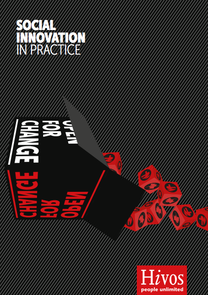Future Now
The IFTF Blog
Open Source Government? Social Innovation in Practice
 Hivos recently published Social Innovation in Practice, a collection of stories about what social innovation looks from the voices of activists and change-makers who are using new methods for greater impact. I was honored to contribute a chapter about App4Gov, our Governance Futures Lab's idea to use open-source technology to collaboratively rewrite democracy.
Hivos recently published Social Innovation in Practice, a collection of stories about what social innovation looks from the voices of activists and change-makers who are using new methods for greater impact. I was honored to contribute a chapter about App4Gov, our Governance Futures Lab's idea to use open-source technology to collaboratively rewrite democracy.
Read an excerpt from below and access the entire version in Hivos' free downloadable book.
Open Source Government?
Fork Me: App4Gov
By David Evan Harris for Hivos
What if an app could run for elected office? Imagine: when your elected official made a decision that you did not like, you could simply reprogram him or her—with the support of your co-constituents, of course. Preposterous, you might think? Well, if we humans can use open-source technology tools to collaboratively write the best encyclopedia in the world, and build the core of the world’s most popular mobile operating system, what is to stop us from collaboratively rewriting democracy, as we know it?
But why would it be necessary to rewrite—or reprogram—democracy? Harvard Law Professor Lawrence Lessig describes the present situation in the US as follows: “...the corruption of today is in plain sight. The mechanism of its reach is displayed to everyone. It is the simple and pervasive economy of influence that buys access and more through campaign cash. And then without explicit recognition, the actions of our government are guided by the understanding of how those acts will affect the opportunity to raise money."
This problem is not easily solved within the system that produced it. Lessig underlines this intractability in his Anti-Corruption Pledge campaign: “...politicians won’t talk about this because they’re all hypocritical if they make this the number one issue. They have to live by the very system which is corrupt.” Candidates spent more than $7 billion on their campaigns during the 2012 U.S. election.
Unfortunately, a similar problem pervades governance processes the world over: elected officials respond quickly and efficiently to opinions that are backed by the financiers of their campaigns, but slowly and inefficiently to the opinions of their constituents. Without fundamentally restructuring thedeep internal logic driving the decisions of our elected officials, makingpublic policy in the public interest is nearly impossible.
App4Gov came out of a deep desire to fix this problem and give every citizen a fast and efficient platform to participate in the policymaking process without having to back those ideas up with cash. It is as much a thought experiment and artifact from the future as it is a performance art intervention and a deliberate provocation: “Hello, politicians! With all your focus on fundraising, would we constituents just be better off getting an app to replace you?”
Together with colleagues at the Governance Futures Lab, I explored the possibility of such an app, even entertaining the notion of mounting a campaign to run this app as a candidate for the United States Senate, representing the state of California. We would know that the app is not corrupt, because every single decision it makes would be completely transparent and determined by citizens.
Read the entire chapter in Hivos' free downloadable book, Social Innovation in Practice.
 IFTF's Governance Futures Lab brings social inventors and futures thinking to the challenge of designing better systems of governance. Through a range of public activities and initiatives, our goal is to facilitate the definition and invention of new governance systems appropriate for an age of planetary challenges and human responsibility.
IFTF's Governance Futures Lab brings social inventors and futures thinking to the challenge of designing better systems of governance. Through a range of public activities and initiatives, our goal is to facilitate the definition and invention of new governance systems appropriate for an age of planetary challenges and human responsibility.
Want to find out more?
- Learn more about the Governance Futures Lab
- Follow the conversation @iftf
- Contact Sean Ness (sness@iftf.org or 650-233-9517)



